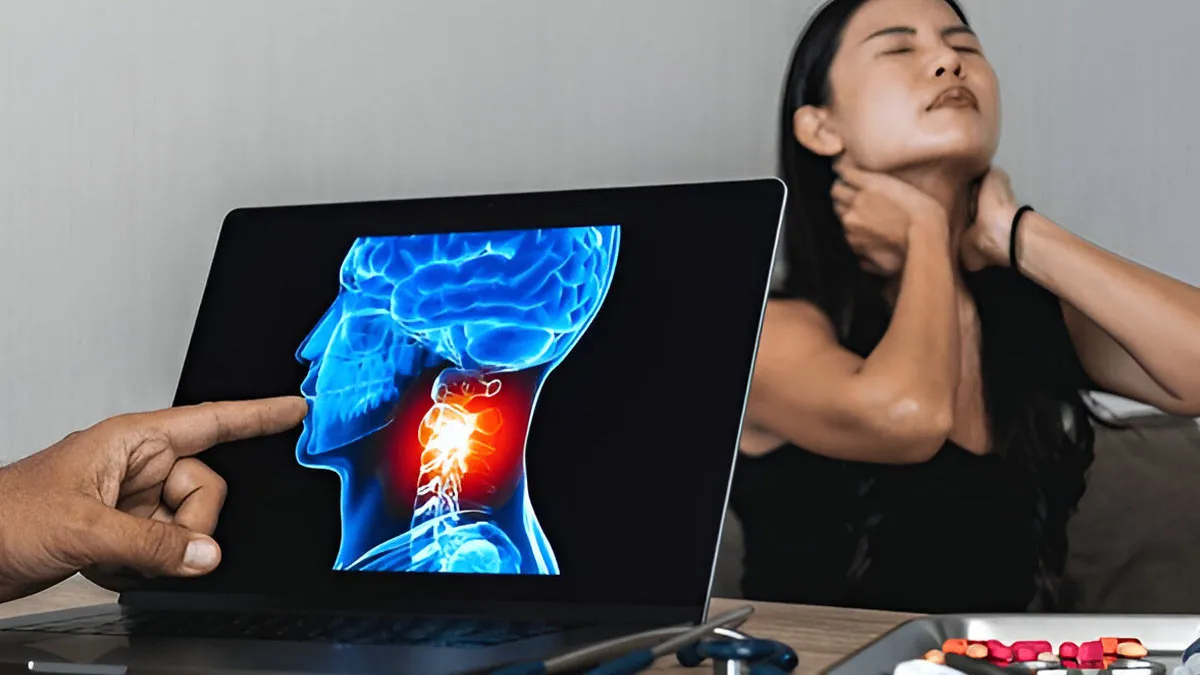
A major challenge when it comes to head and neck cancers is the lack of specific symptoms, which are often overlooked. As a result, diagnoses can occur at advanced stages when treatment becomes more complicated and aggressive, adversely impacting outcomes. When detected early, head and neck cancers are potentially curable, and patients and healthcare practitioners must be vigilant to identify the signs early.
Table of Content:-
We spoke to Dr Alan L Ho, MD, PhD, Head and Neck Medical Oncologist and Cellular Therapist, Memorial Sloan Kettering Cancer Center, New York, US, who listed the early signs of head and neck cancer.
Globally, head and neck cancer is the seventh most common form of cancer, accounting for approximately 8,90,000 cases and 4,50,000 deaths each year, with reports indicating that the incidence rate is higher in India than in most other parts of the world.
Symptoms Of Head and Neck Cancer
“Head and neck cancer is a collective term used to describe malignant tumours that develop in various regions of the head and neck. This includes cancers of the nasal cavity and sinuses, larynx (voice box), mouth, throat, tongue, salivary glands, skin, and thyroid,” explained Dr Ho. Some of the most common symptoms of head and neck cancer include:

- Pain or weakness in the face: A common symptom of mouth or salivary gland cancer is experiencing pain in the face that does not go away.
- Difficulties in jaw movement: Tumours can affect the muscles, nerves, or bones in the jaws, making it difficult to move the jaw properly.
- Mouth ulcers: A very common symptom of mouth cancer is an ulcer that does not heal.
- Difficulty in chewing or swallowing: Patients with head and neck cancer often experience pain or a burning sensation when chewing and swallowing food. Some may feel like the food is stuck in their throat, or the food and liquids are entering the windpipe, or they cough profusely.
- Speech issues: Head and neck cancer can affect patients’ voices, making them sound different. Some patients’ voices may become quieter or huskier. Other issues include sounding like they have a persistent cold, slurring, or having trouble pronouncing some sounds.
- Breathing difficulties: A common sign of throat cancer is breathing difficulties. Similarly, sinus cancer and other head and neck cancers cause a blocked nose. Some may experience nosebleeds.
- Lumps on the back of the neck, jaw, or mouth: The most common sign of head and neck cancer is a lump in the jaw or mouth. They can also form in the lips. A sign of thyroid cancer is a lump in the neck. It may also be caused by an enlarged lymph node. Swelling in lymph nodes in the neck is a common sign of head and neck cancer.
- Weight loss: As head and neck cancer makes it painful to eat or swallow, patients can lose weight.
- Ear pain or hearing loss: A common symptom of throat cancer is persistent ear pain. Some patients may also experience ringing in their ears.
- Red or white patches in the mouth: Abnormal patches in the mouth could be a sign of precancerous changes or cancer. If left untreated, red patches (erythroplakia) and white patches (leukoplakia) may lead to cancer.
Risk Factors For Head And Neck Cancer
Several factors also increase the risk of head and neck cancer, and these include human papillomavirus, tobacco usage, alcohol consumption, age (average age of diagnosis is 60), exposure to radiation, certain genetic conditions, chewing betel quid or gutka, poor oral hygiene, and a diet low in fruits and vegetables.
Importance Of Early Detection
For individuals, it is important to be aware of these symptoms to seek care on time. At the same time, healthcare professionals, such as physicians, dentists, and ENT specialists, must also make routine examinations of the oral cavity, throat, and neck a standard practice, especially for high-risk individuals. They must encourage patients to report symptoms early, as timely action ensures effective treatment.
“Early detection forms the first and foremost step in cancer treatment. Like several other cancers, the symptoms of head and neck cancers are often ignored. However, by paying attention to them and promoting proactive screening, both patients and healthcare professionals can improve outcomes. As the prevalence of cancer continues to increase, vigilance and awareness are the strongest weapons to combat the disease and save lives,” concluded Dr Ho.
[Disclaimer: This article contains information provided by an expert and is for informational purposes only. Hence, we advise you to consult your professional if you are dealing with any health issue to avoid complications.]
Also watch this video
How we keep this article up to date:
We work with experts and keep a close eye on the latest in health and wellness. Whenever there is a new research or helpful information, we update our articles with accurate and useful advice.
Current Version